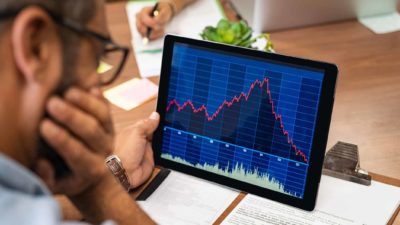Here at Motley Fool we're always about long-term investing.
The idea is simple: Holding quality shares for a long time reduces your exposure to the wild short-term whims of the herd.
But authorities are worried that average Australians in COVID-19 lockdown this year have ignored that advice and have sought to make a quick buck via ASX shares.
The Australian Securities and Investments Commission (ASIC), for example, warned retail investors back in May that high-frequency "day trading" in volatile markets could see them lose their life savings.
"Retail investors chasing quick profits by playing the market over the short term have traditionally performed poorly – in good times and bad – even in relatively stable, less volatile market conditions," stated ASIC.
"For retail investors [it] is particularly dangerous, and likely to lead to heavy losses – losses that could not happen at a worse time for many families."
COVID-19 ASX share trading dwarfs gambling
Astounding figures have been revealed about how new retail investors are diving in.
Corporate advisory firm Vesparum Capital found that between late February and middle of May, retail traders bought $9 billion of Australian shares.
Compare this with the first quarter of this year – before the coronavirus pandemic really took hold – when $4 billion was gambled on lotteries, poker machines and sports betting, according to Roy Morgan.
You might think diverting money away from gambling into shares is a positive outcome from the COVID-19 lockdown.
But high-frequency trading is just another form of punting.
"This is an alternative to gambling," said UTS academics David Michayluk, Warren Hogan and Gerhard Van de Venter on The Conversation.
"While it's risky, it's arguably no riskier than sports betting, casinos or poker machines."
During the same period that retail investors were net buyers of $9 billion, institutional investors sold off $11 billion of shares. Yikes.
Small and mid-cap punting is rife
Not only is high-frequency trading among retail investors a worry, they are going for big wins (and big losses) with high-risk stocks.
A joint University of New South Wales (UNSW) and University of Melbourne study has shown amateur investors have been moving away from blue-chip shares to deliberately put their money on smaller cap companies.
UNSW professor Carole Comerton-Forde and University of Melbourne senior lecturer Zhuo Zhong reported that retail investors were not just buying up large-cap ASX shares such as BHP Group Ltd (ASX: BHP) and Commonwealth Bank of Australia (ASX: CBA), but diving into highly volatile shares such as AMP Limited (ASX: AMP) and Webjet Limited (ASX: WEB).
Retail investors were also buying "highly leveraged stocks" such as Domino's Pizza Enterprises Ltd (ASX: DMP) and Seek Limited (ASX: SEK), as well as ASX shares that had seen their share prices falling before the lockdown such as Myer Holdings Ltd (ASX: MYR) and Flight Centre Travel Group Ltd (ASX: FLT).
Comerton-Forde and Zhong added that, in contrast, institutional investors were net sellers of these stocks.
Why are Australians gambling on small cap shares?
While Comerton-Forde and Zhong don't have any academic evidence of the reasons behind the speculative purchases, they have an opinion.
"It may be due people looking for entertainment in the absence of usual leisure activities. This has been dubbed the 'Boredom Markets Hypothesis'," they wrote.
"It might also just be another form of gambling – 'taking a punt' in the absence of sports betting opportunities."
Chief executive of US finance firm Omega Advisors, Leon Cooperman, told NBC in June that things would end badly for amateurs jumping in for a thrill.
"From my experience, this kind of stuff will end in tears."









